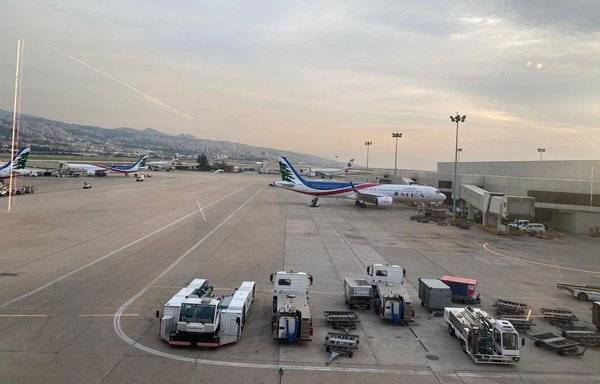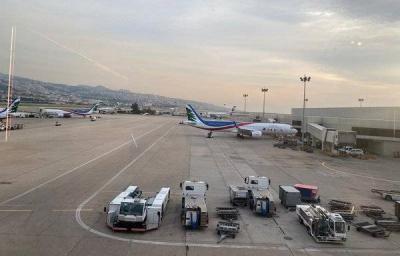After years of calls for the reopening of Qlay'at Airport, particularly from opponents of Hezbollah who argue that Rafic Hariri International Airport is politically and militarily under the party's control, the National Moderation Bloc, which includes MPs from northern Lebanon, has reignited the "battle" for the operation of Qlay'at Airport. This is justified by economic and national reasons, according to one of its members, the head of the Parliamentary Works Bloc, Sajji Attiyah. He stated to "Asharq Al-Awsat": "This is our issue, and we will pursue it to the end, especially given the problems that Rafic Hariri International Airport is facing and its capacity exceeding the specified limit of 6 million people annually."
A decision had been made in the government to expand Beirut Airport, but it was described as a "deal," leading to criticisms that resulted in its cancellation. In recent years, there has been interest from several parties in Qlay'at Airport (which is located 7 kilometers from the Lebanese border with Syria in northern Lebanon) due to its location on the international road linking Tripoli to Homs and Lattakia, making it a potential key player in the reconstruction of Syria.
Attiyah confirms that there is a ready study for the economic and tourism feasibility of the airport, stating that the matter only requires political approval. He emphasizes that its reopening has become imperative, especially given the issues arising at Beirut Airport, particularly regarding its capacity limit. He remarked that their bloc has met with various blocs, and there was support for their demand.
Regarding the stance of Hezbollah, which some attribute to the failure to reopen Qlay'at Airport, Attiyah confirms that the party's MPs do not have an opposing stance, saying: "The party's MPs have expressed some concerns that do not revolve around logistical and technical issues, and we have provided clear clarifications in this regard." He noted that Qlay'at Airport, currently used as a military airbase, could welcome three million passengers annually if reopened, which would alleviate pressure on Beirut Airport and provide economic benefits through cargo, export, charter flights, and job opportunities for young Lebanese.
He stresses that there is no financial problem securing funding for the airport's operation; instead, the issue is distinctly political, explaining that the estimated cost for its rehabilitation is $60 million, which the private sector can undertake through a Build Operate Transfer (BOT) model. When asked if reopening the airport is possible amid current political disagreements and criticism of the caretaker government, Attiyah reiterates that "if a political decision is made, there is no issue, as it can be reopened today under the management of Beirut Airport, with adjustments made when a new government is formed and a regulatory authority is established."
In 2012, Head of the Independence Movement, current MP Michel Moawad, accused the Syrian regime (during its presence in Lebanon) of obstructing its operation due to its proximity to the Lebanese-Syrian border and its economic impact on Damascus, and later Hezbollah, particularly since 2011 "under flimsy pretexts such as arms smuggling, federalism, and the events occurring in Syria," according to Moawad.
**Tourism Needs**
The economic revenues from Qlay'at Airport, which requires the rehabilitation of runways and buildings, primarily include the tourism aspect as it could provide additional flights to Beirut at lower prices similar to many countries. This point was highlighted by the President of the Federation of Tourism Unions in Lebanon, Pierre Ashkar, who urged the reopening of the airport in northern Lebanon for civil purposes, especially passenger transport, considering this an urgent need for tourism and the national economy.
While expressing his support for the demands of the people of the north and Akkar on this rightful issue, he stated in a release: "Touristically and technically, Lebanon cannot attract low-cost airline flights if Qlay'at Airport is not reopened, thus depriving Lebanon of many tourists from around the world," pointing out that "according to local and international civil aviation laws, major airports like Rafic Hariri Airport in Beirut are not allowed to receive these flights."
He emphasized that "the issue of receiving low-cost flights has also become a tourism necessity for Lebanon, especially after recording significant numbers of arrivals during the summer season, which Lebanon can attract from various nationalities." Ashkar reiterated "the necessity for the relevant authorities to quickly take all necessary measures to reopen this vital economic facility, to open the way to attract more tourists from various nationalities, and to contribute to improving the economic and social conditions of the Akkar and Tripoli regions."
Several studies have been conducted on the reopening of Qlay'at Airport, one of which was by the Ministry of Public Works, all confirming that the development project aims to achieve balanced growth in Lebanese regions. A study by the Ministry of Public Works noted that its development and operation would lead to growth in trade, agriculture, industry, and tourism for Lebanon and the region, as well as provide unique tours and sports activities, being close to tourist sites and situated on the Mediterranean coast. Moreover, reopening it presents an opportunity to involve the private sector and create about 6,000 job opportunities in the first year.




